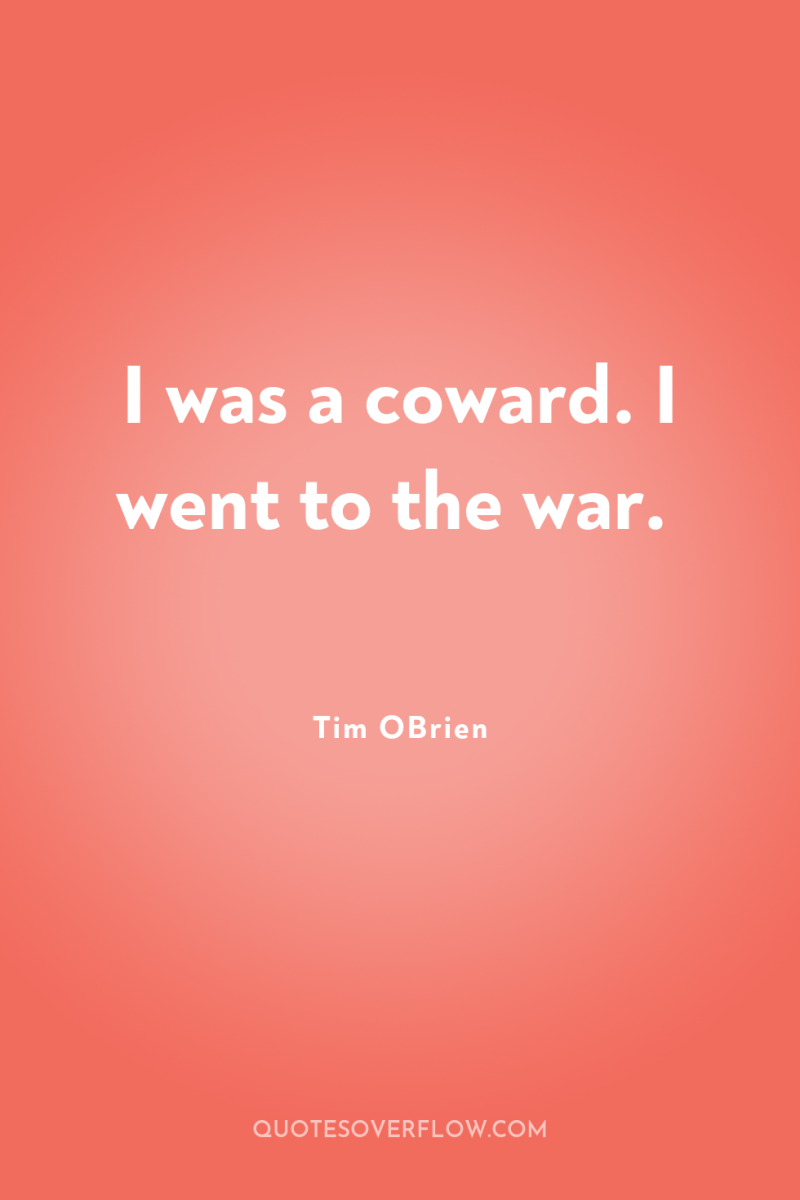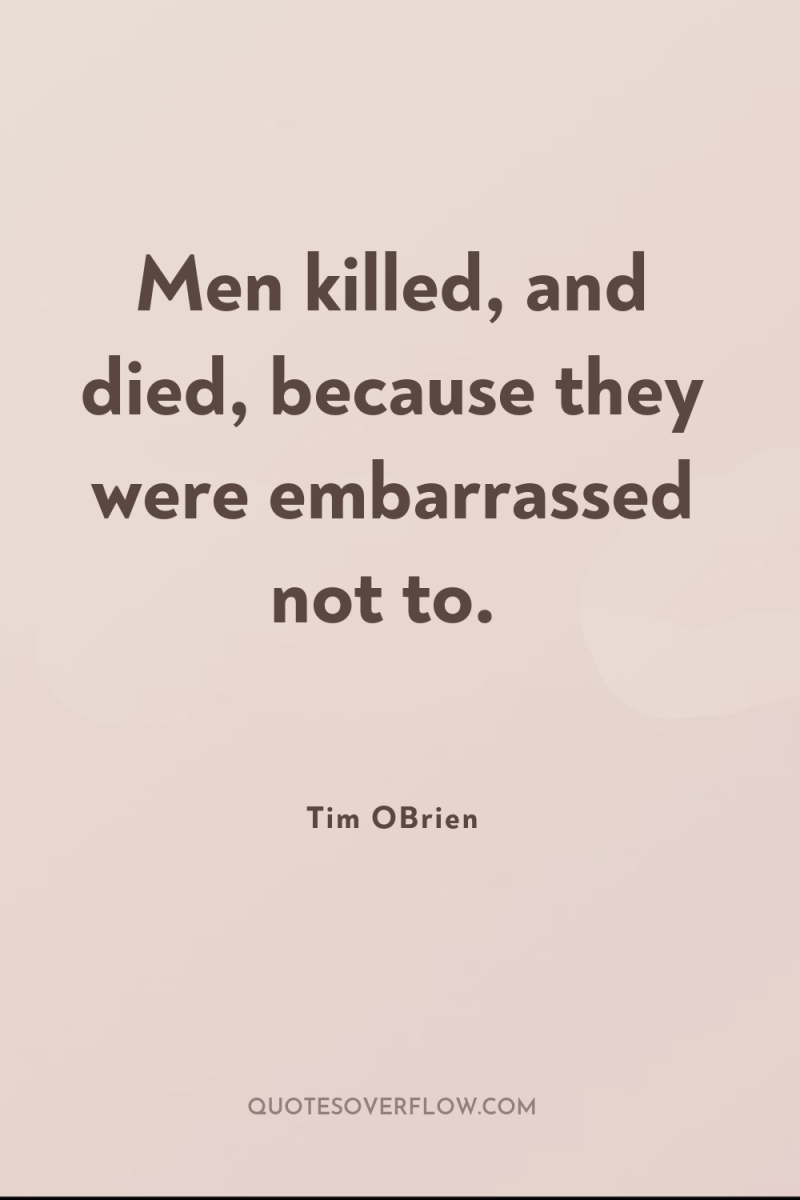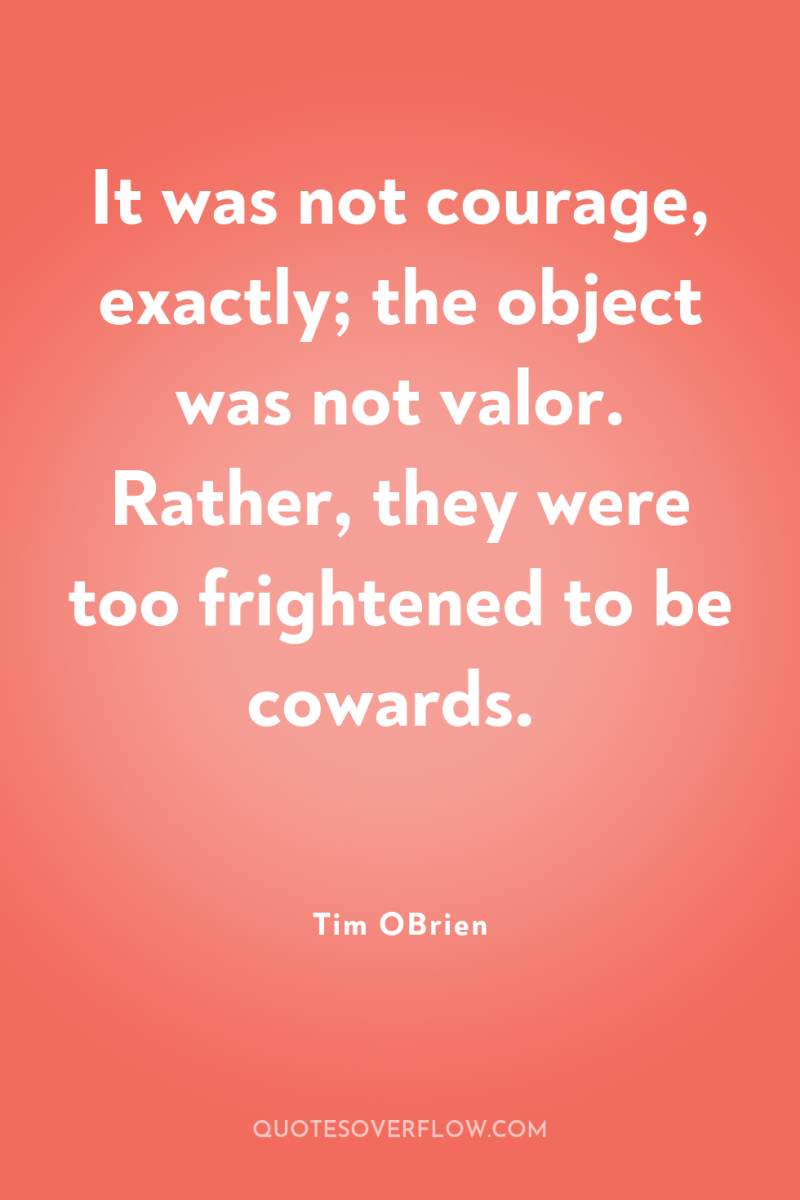1
In any war story, but especially a true one, it's difficult to separate what happened from what seemed to happen. What seems to happen becomes its own happening and has to be told that way. The angles of vision are skewed. When a booby trap explodes, you close your eyes and duck and float outside yourself.. The pictures get jumbled, you tend to miss a lot. And then afterward, when you go to tell about it, there is always that surreal seemingness, which makes the story seem untrue, but which in fact represents the hard and exact truth as it seemed.Tim OBrien
2
It’s a hard thing to explain to somebody who hasn’t felt it, but the presence of death and danger has a way of bringing you fully awake. It makes things vivid. When you’re afraid, really afraid, you see things you never saw before, you pay attention to the world. You make close friends. You become part of a tribe and you share the same blood- you give it together, you take it together.Tim OBrien
3
The thing about a story is that you dream it as you tell it, hoping that others might then dream along with you, and in this way memory and imagination and language combine to make spirits in the head. There is the illusion of aliveness.Tim OBrien
4
Forty-three years old, and the war occurred half a lifetime ago, and yet the remembering makes it now. And sometimes remembering will lead to a story, which makes it forever. That’s what stories are for. Stories are for joining the past to the future. Stories are for those late hours in the night when you can’t remember how you got from where you were to where you are. Stories are for eternity, when memory is erased, when there is nothing to remember except the story.Tim OBrien
5
A true war story is never moral. It does not instruct, nor encourage virtue, nor suggest models of proper human behavior, nor restrain men from doing the things men have always done. If a story seems moral, do not believe it. If at the end of a war story you feel uplifted, or if you feel that some small bit of rectitude has been salvaged from the larger waste, then you have been made the victim of a very old and terrible lie. There is no rectitude whatsoever. There is no virtue. As a first rule of thumb, therefore, you can tell a true war story by its absolute and uncompromising allegiance to obscenity and evil. .Tim OBrien
6
It was my view then, and still is, that you don't make war without knowing why. Knowledge of course, is always imperfect, but it seemed to me that when a nation goes to war it must have reasonable confidence in the justice and imperative of its cause. You can't fix your mistakes. Once people are dead, you can't make them undead.Tim OBrien
7
You can tell a true war story if it embarrasses you. If you don't care for obscenity, you don't care for the truth; if you don't care for the truth, watch how you vote. Send guys to war, they come home talking dirty.Tim OBrien
8
I'm skimming across the surface of my own history, moving fast, riding the melt beneath the blades, doing loops and spins, and when I take a high leap into the dark and come down thirty years later, I realize it is as Tim trying to save Timmy's life with a story.Tim OBrien

9
I was a coward. I went to the war.Tim OBrien
10
Mitchell Sanders was right. For the common soldier, at least, war has the feel-the spiritual texture-of a great ghostly fog, thick and permanent. There is no clarity. Everything swirls. The old rules are no longer binding, the old truths no longer true. Right spills over into wrong. Order blends into chaos, love into hate, ugliness into beauty, law into anarchy, civility into savagery. The vapors suck you in. You can't tell where you are, or why you're there, and the only certainty is overwhelming ambiguity.Tim OBrien
11
They did not submit to the obvious alternative, which was simply to close the eyes and fall. So easy, really. Go limp and tumble to the ground and let the muscles unwind and not speak and not budge until your buddies picked you up and lifted you into the chopper that would roar and dip its nose and carry you off to the world. A mere matter of falling, yet no one ever fell. It was not courage, exactly; the object was not valor. Rather, they were too frightened to be cowards.Tim OBrien
12
First Lieutenant Jimmy Cross carried letters from a girl named Martha, a junior at Mount Sebastian College in New Jersey. They were not love letters, but Lieutenant Cross was hoping, so he kept them folded in plastic at the bottom of his rusack. In the late afternoon, after a day's march, he would dig his foxhole, wash his hands under a canteen, unwrap the letters, hold them with the tips of his fingers, and spend the last hour of light pretending.Tim OBrien
13
To generalize about war is like generalizing about peace. Almost everything is true. Almost nothing is true. At its core, perhaps, war is just another name for death, and yet any soldier will tell you, if he tells the truth, that proximity to death brings with it a corresponding proximity to life. After a firefight, there is always the immense pleasure of aliveness. The trees are alive. The grass, the soil–everything. All around you things are purely living, and you among them, and the aliveness makes you tremble. You feel an intense, out-of-the-skin awareness of your living self–your truest self, the human being you want to be and then become by the force of wanting it. In the midst of evil you want to be a good man. You want decency. You want justice and courtesy and human concord, things you never knew you wanted. There is a kind of largeness to it, a kind of godliness. Though it’s odd, you’re never more alive than when you’re almost dead. You recognize what’s valuable. Freshly, as if for the first time, you love what’s best in yourself and in the world, all that might be lost. At the hour of dusk you sit at your foxhole and look out on a wide river turning pinkish red, and at the mountains beyond, and although in the morning you must cross the river and go into the mountains and do terrible things and maybe die, even so, you find yourself studying the fine colors on the river, you feel wonder and awe at the setting of the sun, and you are filled with a hard, aching love for how the world could be and always should be, but now is not.Tim OBrien

14
They would repair the leaks in their eyes.Tim OBrien

15
Men killed, and died, because they were embarrassed not to.Tim OBrien

16
I hated him for making me stop hating himTim OBrien
17
They used a hard vocabulary to contain the terrible softness. Greased they'd say. Offed, lit up, zapped while zipping. It wasn't cruelty, just stage presence. They were actors. When someone died, it wasn't quite dying, because in a curious way it seemed scripted, and because they had their lives mostly memorized, irony mixed with tragedy, and because they called it by other names, as if to encyst and destroy the reality of death itself.Tim OBrien

18
It was not courage, exactly; the object was not valor. Rather, they were too frightened to be cowards.Tim OBrien
19
What stories can do, I guess, is make things present. I can look at things I never looked at. I can attach faces to grief and love and pity and God. I can be brave. I can make myself feel again.Tim OBrien
20
It was a flight, a kind of fleeing, a kind of falling, falling higher and higher, spinning off the edge of the earth and beyond the sun and through the vast silent vacuum where there were no burdens and where everything weighed exactly nothing.Tim OBrien
21
Zapped while zipping.Tim OBrien
22
I detested their blind, thoughtless, automatic acquiescence to it all, their simpleminded patriotism, their prideful ignorance, their love-it-or-leave-it platitudes, how they were sending me off to a war they didn't understand and didn't want to understand. I held them responsible. By God, yes, I did. All of them - I held them personally and individually responsible - the polyestered Kiwanis boys, the merchants and the farmers, the pious churchgoers, the chatty housewives, the PTA and the Lions club and the Veterans of Foreign Wars and the fine outstanding gentry out at the country club. They didn't know Bao Dai from the man in the moon. They didn't know history. They didn't know the first thing about Diem's tyranny, or the nature of Vietnamese nationalist, or the long colonialism of the French - this was all too damn complicated, it required some reading - but no matter, it was a war to stop the Communists, plain and simple, which was how they liked things, and you were a treasonous pussy if you had second thoughts about killing or dying for plain and simple reasons. .Tim OBrien
23
But I do like churches. The way it feels inside. It feels good when you just sit there, like you're in a forest and everything's really quiet, except there's still this sound you can't hear.Tim OBrien
24
Stories can save us.Tim OBrien
25
Stories are for joining the past to the future.Tim OBrien
26
What stories can do, I guess, is make things present.Tim OBrien
27
In many ways he was like America itself, big and strong, full of good intentions, a roll of fat jiggling at his belly, slow of foot but always plodding along, always there when you needed him, a believer in the virtues of simplicity and directness and hard labor.Tim OBrien
28
I survived, but it's not a happy ending.Tim OBrien
29
…he wanted to sleep inside her lungs and breathe her blood and be smothered. He wanted her to be a virgin and not a virgin all at once. He wanted to know her. Intimate secrets: Why poetry? Why so sad? Why that grayness in her eyes? Why so alone? Not lonely, just alone - riding her bike across campus or sitting off by herself in the cafeteria - even dancing, she danced alone - and it was the aloneness that filled him with love. He remembered telling her that one evening. How she nodded and looked away. And how, later, when he kissed her, she received the kiss without returning it, her eyes wide open, not afraid, not a virgin’s eyes, just flat and uninvolved. .Tim OBrien
30
Whenever he told the story, Rat had a tendency to stop now and then, interrupting the flow, inserting little clarifications or bits of analysis and personal opinion. It was a bad habit, Mitchell Sanders said, because all that matters is the raw material, the stuff itself, and you can’t clutter it up with your own half-baked commentary. That just breaks the spell. It destroys the magic. What you have to do, Sanders said, is trust your own story. Get the hell out of the way and let it tell itself.Tim OBrien
31
You can't fix your mistakes. Once people are dead, you can't make them undead.Tim OBrien
32
You learn, finally, that you'll die, and so you try to hang on to your own life, that gentle, naive kid you used to be, but then after a while the sentiment takes over, and the sadness, because you know for a fact that you can't ever bring any of it back again. You just can't.Tim OBrien
33
Don't throw away luck on little stuff. Save it up.Tim OBrien
34
Each morning, despite the unknowns, they made their legs move.Tim OBrien
35
When a man died, there had to be blame. Jimmy Cross understood this. You could blame the war, You could blame the idiots who made the war. You could blame Kiowa for going to it. You could blame the rain. You could blame the river. You could blame the field, the mud, the climate. You could blame the enemy. You could blame the mortar rounds. You could blame people who were too lazy to read a newspaper, who were bored by the daily body counts, who switched channels at the mention of politics. You could blame whole nations. You could blame God. You could blame the munitions makers or Karl Marx or a trick of fate of an old man in Omaha who forgot to vote. .Tim OBrien